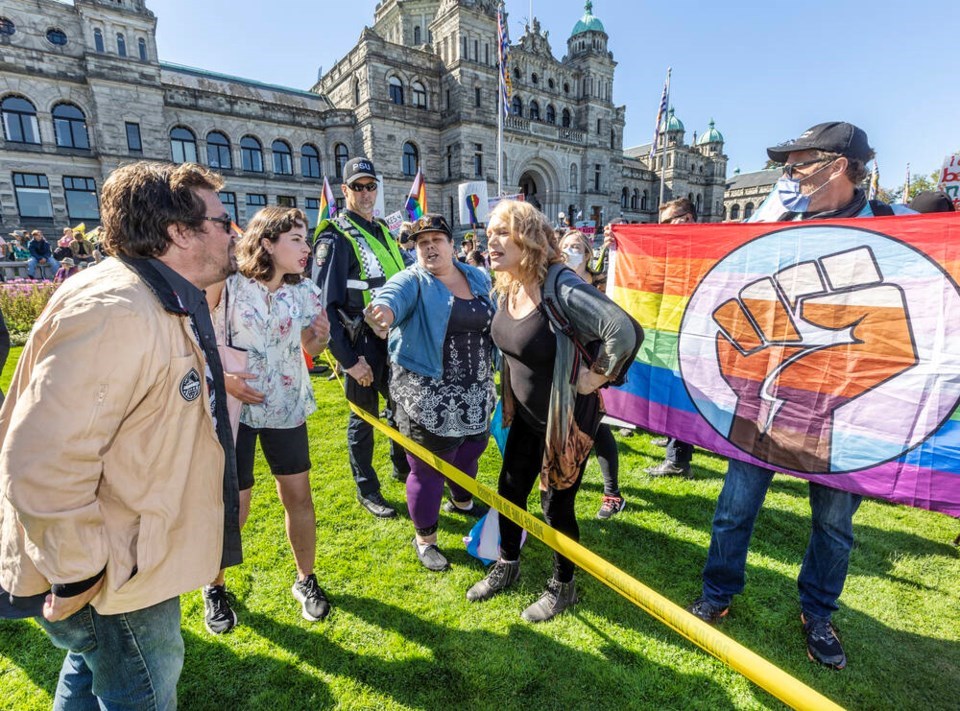“We want to make sure that schools are inclusive and safe places…” said the teacher at the anti- protest on September 20th, 2023. I’m guessing that almost every one of the protesters and counter-protesters would probably say they’re pro-kindness, pro-tolerance, pro-human rights and anti-bullying, if you asked them.
I wasn’t seeing a lot of tolerance though. Slogans, rhetoric and placards aren’t really conducive to that mindset. Tolerance requires a willingness not just to listen thoughtfully to different perspectives but also to have hard conversations, which is quite different from being hard on each other.
I belong to an organization that encompasses a wide range of opinions and belief systems, from New Thought to Christians, Sikhs, Hindus, Muslims and others. We have a diverse population in this country. Are we not expecting to have diverse opinions? And are we just going to ignore them or shout them down if they don’t suit our taste?
No one wants to live in a polarized society. Avoiding that is going to require a little less “us and them” thinking and a little more compromise. Not compromising our values, but compromising on certain actions or behaviours, so that everyone feels a little more comfortable and a little more heard.
The first step is toning down the rhetoric and figuring out what’s really eating the other side, instead of coming out swinging. One headline shouted, “B.C. human rights commissioner slams 'hate-fuelled' anti-LGBTQ2S+ rallies”. Across the country officials spoke of the protests as “fuelling hate”. But just a minute. Hate?
I’m sure there are extremists on both sides, but there are also plenty of moderates. The afternoon of the protest we were on the way to ICA, picking up a Syrian friend en route. I read aloud an email from a Palestinian colleague, passing on a that seemed rational, balanced, and not at all hateful. The gist of it was a concern that schools needed to be careful not to overstep their bounds through the imposition of a specific worldview without the knowledge or consent of parents.
When we picked up our friend, I asked him, “How are the kids?” He said, “All good, except for the schools. We’re keeping the kids home today. Everyone in our neighbourhood is keeping their kids home.” We’d spoken about this before. They have no problem with the acceptance of difference, but I knew they were upset about the more explicit video material being shown to their children, aged 7, 10 and 12.
As far as I can tell, there isn’t actually much difference in the core values of acceptance, fairness and kindness, which are expressed by the majority on both sides. The difference is in a disagreement on the methods used to transmit those values to children in schools.
This doesn’t mean ignoring differences. They can be acknowledged and accepted. But it may mean not overtly advocating for or against any ideology or worldview, with special care taken in elementary schools. There should be room for calm, nuanced negotiation that involves asking a diverse group of parents which teaching tools and methods might allow them to feel that their kids are in a safe space. Whatever those may be, they need to allow all children to feel included, loved and respected, no matter what kind of household and culture they come from. That’s kindness, openness and tolerance at its best.
Sheila Flood is the E.D. of the Victoria Multifaith Society and member of the Bahá’í community.
You can read more articles on our interfaith blog, Spiritually Speaking at /blogs/spiritually-speaking



